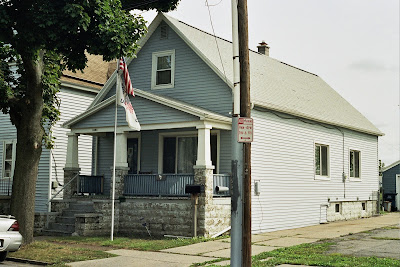My parents on their wedding day, my Grandfather behind them with a shotgun.
My maternal Grandfather, Bernard Arendt, went by the sobriquet of "Buck Benny" or usually just plain Buck. The nickname was given to him by persons unknown based on a Jack Benny radio show where the phrase, "Jack Benny rides again." was part of the comic routine. I understand the Benny part, being short for Bernard, but the Buck is a total mystery.
My Grandfather was a character with a capital "C". He was tattooed over most of his upper body below the neck. This was supposedly the result of a stint in the peace time Navy between the two World Wars. He explained that all he and his shipmates did was get drunk on shore leave and get tattoos. The drinking part would follow him back to civilian life and cause no end of problems for his family. My Mother still tells bitter stories of his carousing at the local gin mill and her often having the humiliating task of bringing him home. The family lived hand-to-mouth while Buck spent his paychecks buying rounds of drinks for all his friends. The drinking ended when my parents were preparing to get married and Mom threatened to never speak to him again if he got drunk at the wedding. He apparently never touched the bottle again.
My Grandparents on their wedding day. Bernard Arendt and Clara Krygier
The man I knew was an adoring grandfather. He was a sportsman; hunting and fishing were his hobbies. He didn't shave. He plucked his whiskers with tweezers, and grooming habit my brother and I watched with abject fascination. He liked to watch the Friday night fights on TV, that is until a fighter died in the ring on national television. He never watched the fights much after that. He was a deaf as a doorknob, the result of his job as a drop forge hammer operator at a tool and die manufacturer. Conversations with him were always carried on at shout level. We'd be in the basement and he'd fart and tell us there was a polecat (skunk) hiding somewhere. We'd drive over the metal roadway of a drawbridge and yell that we were taking off. Anytime he saw a boat his immediate response was, "Yaja boat!".
My grandparents as I remember them best.
100 Kelburn St.
As I have delved in the history of our family I have discovered the pieces of the puzzle of that side of my family. Mateus Arendt came to America from Gdansk, Poland between 1880 and 1890. He would marry Michalena Kubiak in 1899. This was Mateus's second marriage, his previous wife dying in 1898. They had one daughter, Helen. Matthew (as he was known) and Minnie (as she was known) had 5 children: Edmond (Eddie), Leonard, Bernard, Florence and Felicia (Babe). Minnie died in 1933 and Matthew in 1937. My Grandfather and his family were living in his father's home at 100 Kelburn Street at that time. His stepsister Helen evicted them from this house and stole the insurance settlement that was due my Grandfather. The house would eventually go to his youngest sister Babe. Aunt Helen was persona non grata in our family, akin to the Wicked Witch of the West. Bennie was closest to his brother Eddie. My grandparents and Eddie and his wife Helen spent a great deal of time together.
89 Kelburn St.
One time my brother and I were in the backyard at 89 Kelburn, which backed up to a large city park. A shabbily dressed man came to the fence and called us over. While we were talking to him my Grandmother ran out of the house and hustled us in admonishing us not to talk to "bums". The bum turned out to be our Uncle Leonard. Leonard had come home from World War II as damaged goods, "shell shocked" as they called it back then. My Grandfather would give him money from time to time, but he was not welcome in the house when we were around and we were forbidden to talk to him. I never saw him again after that day. The other person in my Grandfather's family I was familiar with was "Auntie Babe", who lived next door to my Father's parents. She doted over my brother and I and plied us with candy from a large cut glass jar in their living room. Even after my family moved out of the city we spent many days back on Kelburn Street.
One habit my Grandfather never overcame was smoking. He was a chain smoker and his brand was Kools. It eventually killed him, despite his finally quitting and getting cancer treatments. While he was dying he holed up in a bedroom in his house and refused to let my brother and I see him. I caught a glimpse of him once near the end, a gaunt figure shrunken from the man who I adored. I was 16 when we got the phone call that said he had passed. My grandmother would eventually sell the house on Kelburn and move in to my room when I left for college in Chicago.





